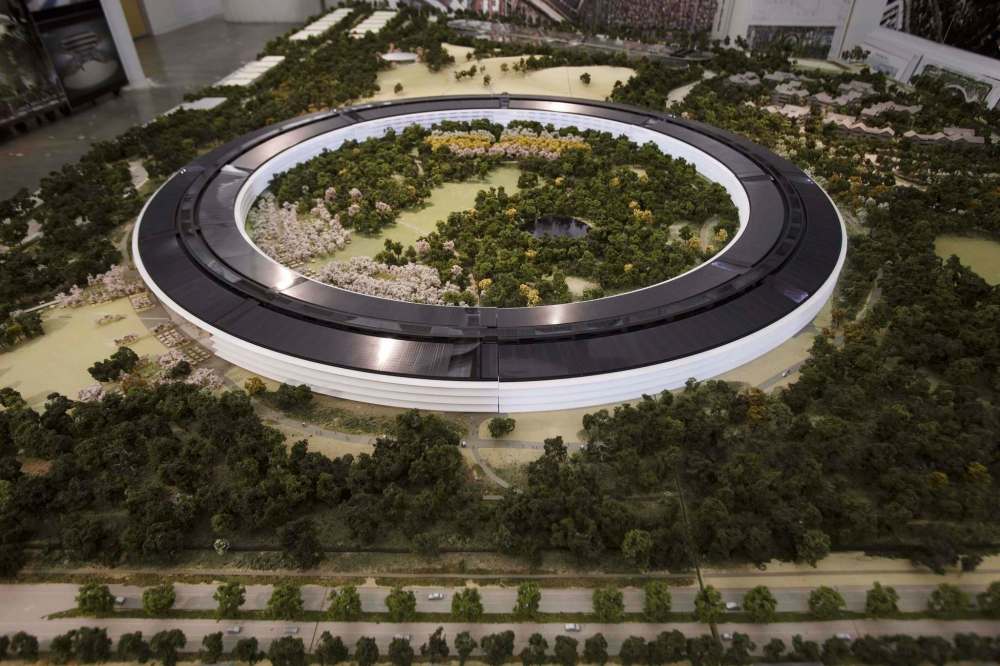Apple Park to open in April
Long-awaited campus will host more than 12,000 employees
Advertisement
Read this article for free:
or
Already have an account? Log in here »
To continue reading, please subscribe:
Monthly Digital Subscription
$1 per week for 24 weeks*
- Enjoy unlimited reading on winnipegfreepress.com
- Read the E-Edition, our digital replica newspaper
- Access News Break, our award-winning app
- Play interactive puzzles
*Billed as $4.00 plus GST every four weeks. After 24 weeks, price increases to the regular rate of $19.00 plus GST every four weeks. Offer available to new and qualified returning subscribers only. Cancel any time.
Monthly Digital Subscription
$4.75/week*
- Enjoy unlimited reading on winnipegfreepress.com
- Read the E-Edition, our digital replica newspaper
- Access News Break, our award-winning app
- Play interactive puzzles
*Billed as $19 plus GST every four weeks. Cancel any time.
To continue reading, please subscribe:
Add Free Press access to your Brandon Sun subscription for only an additional
$1 for the first 4 weeks*
*Your next subscription payment will increase by $1.00 and you will be charged $16.99 plus GST for four weeks. After four weeks, your payment will increase to $23.99 plus GST every four weeks.
Read unlimited articles for free today:
or
Already have an account? Log in here »
Hey there, time traveller!
This article was published 27/02/2017 (3152 days ago), so information in it may no longer be current.
CUPERTINO, Calif. — One of the most iconic companies in the world on Wednesday set a time for when it will move into what looks to become one of Silicon Valley’s most iconic business centres.
Apple said it will begin moving more than 12,000 employees into its new Apple Park campus in April. Construction of the campus in Cupertino, Calif., will continue through the summer, and the company said it will take about six months before all of its employees move into the location.
If there was any doubt about who was the inspiration for Apple Park, such thoughts were swept aside as Apple said the facility’s main theatre will be named the Steve Jobs Theatre.

The 1,000-seat auditorium will be enclosed in a 20-foot-tall glass cylinder that’s 165 feet in diameter and supported by a metallic carbon-fibre roof. Apple said the theatre will sit on top of a hill that is one of the highest spots in Apple Park.
Jobs, the late co-founder and chief executive of Apple, presented his original plans for the company’s future home at a Cupertino city council meeting in June 2011. That was Jobs’ last public appearance before his death in October 2011.
“Steve’s vision for Apple stretched far beyond his time with us,” Apple chief executive Tim Cook said in a statement announcing Apple Park’s upcoming opening. “He intended Apple Park to be the home of innovation for generations to come.”
And there will be plenty of space for the innovation Jobs intended.
The main building at Apple Park, a UFO-looking ring, covers 2.8 million square feet and, Apple says, “is clad entirely in the world’s largest panels of curved glass.” The Apple Park campus will replace five million square feet of asphalt and concrete with grassy fields and more than 9,000 drought-resistant and native trees, Apple said.
The massive number of trees isn’t the only aspect of Apple Park that emphasizes the company’s commitment to “going green.” Apple said Apple Park will operate on 100 per cent renewable energy and have one of the world’s largest on-site solar energy installations, which will produce 17 megawatts of rooftop solar power.
Apple also said Apple Park will have the largest naturally ventilated building in the world and it will require no heating or air conditioning for nine months of the year.
The facility was designed by architectural firm Foster & Partners and its final cost is estimated to be more than US$5 billion.
Apple seems to want its employees to also save money on gym memberships, as Apple Park will include more than 3.2 kilometres of walking and running trails and a 100,000-sq.-ft. gymnasium.
Tim Bajarin, president of technology research firm Creative Strategies, called Apple Park “the most technologically advanced building ever created,” and said that it could end up becoming more than something that is just a monument to Steve Jobs’ legacy.
“I believe it will also serve as a showcase,” Bajarin said, “for how office buildings of the future might be designed and built to utilize all types of natural resources and provide the type of working environment that is conducive to collaboration and effective work flow.”
— San Jose Mercury News

